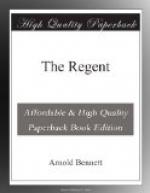The other phenomena of the drawing-room which particularly interested Edward Henry were the Turkey carpet, the four vast easy-chairs, the sofa, the imposing cigar-cabinet and the mechanical piano-player. At one brief period he had hovered a good deal about the revolving bookcase containing the Encyclopaedia (to which his collection of books was limited), but the frail passion for literature had not survived a struggle with the seductions of the mechanical piano-player.
The walls of the room never drew his notice. He had chosen, some years before, a patent washable kind of wall-paper (which could be wiped over with a damp cloth), and he had also chosen the pattern of the paper, but it is a fact that he could spend hours in any room without even seeing the pattern of its paper. (In the same way his wife’s cushions and little draperies and bows were invisible to him, though he had searched for and duly obtained the perfect quality of swansdown which filled the cushions.)
The one ornament of the walls which attracted him was a large and splendidly-framed oil-painting of a ruined castle, in the midst of a sombre forest, through which cows were strolling. In the tower of the castle was a clock, and this clock was a realistic timepiece, whose fingers moved and told the hour. Two of the oriel windows of the castle were realistic holes in its masonry; through one of them you could put a key to wind up the clock, and through the other you could put a key to wind up the secret musical box, which played sixteen different tunes. He had bought this handsome relic of the Victorian era (not less artistic, despite your scorn, than many devices for satisfying the higher instincts of the present day) at an auction sale in the Strand, London. But it, too, had been supplanted in his esteem by the mechanical piano-player.
He now selected an example of the most expensive cigar in the cigar-cabinet and lighted it as only a connoisseur can light a cigar, lovingly; he blew out the match lingeringly, with regret, and dropped it and the cigar’s red collar with care into a large copper bowl on the centre table, instead of flinging it against the Japanese umbrella in the fireplace. (A grave disadvantage of radiators is that you cannot throw odds and ends into them.) He chose the most expensive cigar because he wanted comfort and peace. The ham was not digesting very well.




